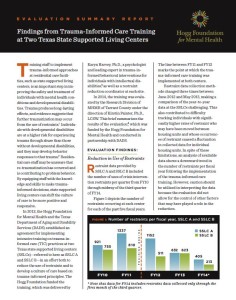Evaluation: Findings from Trauma-Informed Care Training at Two Texas State Supported Living Centers
Introduction
Training staff to implement trauma-informed approaches at residential care facilities, such as state supported living centers, is an important step in improving the safety and treatment of individuals with mental health conditions and developmental disabilities. Trauma produces long-lasting effects, and evidence suggests that further traumatization may occur from the use of restraints. Individuals with developmental disabilities are at a higher risk for experiencing trauma through abuse than those without developmental disabilities, and they may develop behavior responses to that trauma. Residential care staff may be unaware that re-traumatization has occurred and is contributing to problem behavior. By equipping staff with the knowledge and skills to make trauma-informed decisions, state supported living centers can shift the culture of care to be more positive and responsive.
In 2012, the Hogg Foundation for Mental Health and the Texas Department of Aging and Disability Services (DADS) established an agreement for implementing intensive training on trauma-informed care (TIC) practices at two Texas state supported living centers (SSLCs)—referred to here as SSLC A and SSLC B—in an effort both to reduce the use of restraints and to develop a culture of care based on trauma-informed principles. The Hogg Foundation funded the training, which was delivered by Karyn Harvey, Ph.D., a psychologist and leading expert in trauma-informed behavioral interventions for individuals with intellectual dis¬abilities3, as well as a restraint reduction coordinator at each site.
In 2014, the training was evaluated by the Research Division of MHMR of Tarrant County under the direction of Kirstin Painter, Ph.D., LCSW. This brief summarizes the results of the evaluation4, which was funded by the Hogg Foundation for Mental Health and conducted in partnership with DADS.

